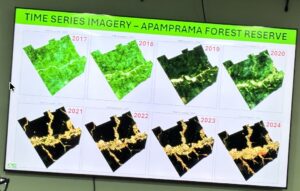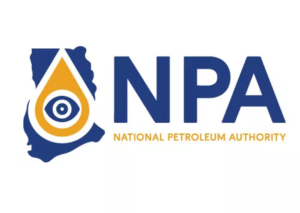
A sweeping crackdown on undocumented excavators has led to the impoundment of over 3,000 heavy-duty machines in just one month, The Hawk has learned from a highly placed source at the Ministry of Lands and Natural Resources. The dramatic seizure follows a new policy directive requiring that all excavators shipped into Ghana must be properly documented before clearing at the ports.
The scale of the enforcement has sent shockwaves across the extractive sector, with the unnamed source revealing that “owners are refusing to step forward to claim their equipment because they simply cannot provide lawful justification for importing them into the country.”
The revelation has laid bare the chaotic and often shadowy logistics fuelling Ghana’s illegal mining industry, known locally as galamsey, which continues to devastate ecosystems, rivers, and livelihoods.
Even more worrying, the source disclosed that an additional 2,000 excavators are currently en route to Ghana via sea vessels packed with machinery that may soon face the same fate if proper documentation is not produced.
Ghost Machines, Lost Forests
For years, excavators — the most potent tools for stripping the earth in search of gold — entered the country without proper registry or traceability, creating an enforcement nightmare for authorities. “No one knew who owned what. That is how impunity thrived,” the source lamented.
The consequences have been dire. According to ministry figures, 44 of Ghana’s 228 gazetted forest reserves have been severely degraded, directly linked to illegal mining. Authorities are currently battling to reclaim nearly 5,000 hectares of land — an expanse roughly the size of 7,500 football pitches — from ecological collapse.
In the country’s river basins, the turbidity of water bodies, including the once-pristine Pra, Offin, and Ankobra rivers, has reached levels that threaten both human health and the financial viability of water treatment plants. “Treating water is becoming increasingly expensive. We’re talking thousands of Nephelometric Turbidity Units (NTU),” another source close to the Water Resources Commission told The Hawk. “It’s no longer just an environmental issue. It’s a national crisis.”
A Turning Point?
The crackdown has been welcomed by environmental groups and some community leaders who have long borne the brunt of illegal mining. However, critics say that without robust prosecution and transparent public information about who owns the impounded equipment, the effort could falter.
The government is yet to disclose the identities of importers or corporate entities linked to the impounded excavators — a silence critics say may be shielding politically exposed individuals from public scrutiny.
Still, the scale of the seizures marks what some observers see as a potential turning point in Ghana’s long and bruising battle against environmental degradation.
“For once, the system is catching up with the machinery of destruction,” said a senior analyst at the Centre for Environmental Management and Sustainable Energy (CEMSE), adding, “The real test will be whether this momentum holds, or if we slide back into business as usual once the dust settles.”
Benjamin Nsiah believes the current crackdown lays the groundwork for better regulation. “It’s a necessary step,” he said. “People shouldn’t be allowed to bring heavy-duty machinery into the country without a clear, lawful purpose. This will help enforce accountability and proper integration.”
The Stakes
With thousands of excavators parked in holding zones and hundreds more on their way, Ghana stands at a crossroads in the fight against environmental exploitation. Will enforcement mechanisms hold? Will the impounded machines be auctioned, destroyed, or quietly returned to faceless owners?
As pressure mounts, the country’s commitment to safeguarding its forests, rivers, and rural communities is under the spotlight.
For now, the excavators sit idle. But their story is far from over.






